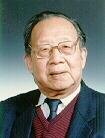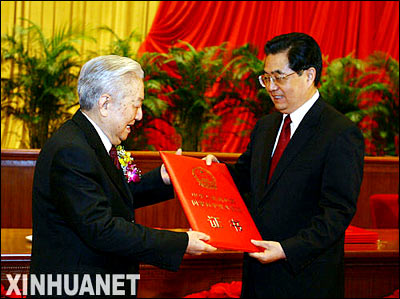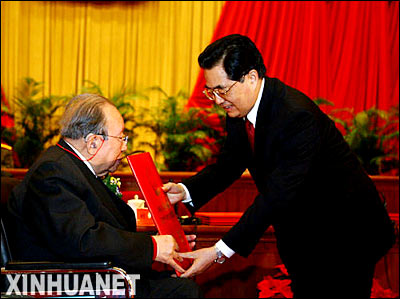Related:
China granted its State Scientific and Technological Award for 2007 on Tuesday to petrochemical scientist Min Enze and botanist Wu Zhengyi for progress in technological innovation. (Video: China awards science prizes  )
)
Chinese President Hu Jintao, with other senior leaders, presented the 5 million yuan (about US$600,000) awards at the annual national science-technology award ceremony at the Great Hall of the People.
President Hu Jintao presents the awards to Min Enze
Senior petrochemical engineer Min, 84, a native of Sichuan Province in southwest China, is a member of the Sinopec Science and Technology Committee and a senior advisor of the Research Institute of Petroleum Processing (RIPP).
Min graduated in 1946 from the then National Central University and obtained a doctorate in chemical engineering from Ohio State University in 1950.
Min became an academician of the Chinese Academy of Sciences (CAS) in 1980, a research fellow of the Third World Academy of Sciences in 1993 and an academician of the Chinese Academy of Engineering in 1994.
As an innovator in petrochemical technology, Min laid the foundation of petroleum refining applied catalysis in China, according to the award review committee.
Min has dedicated his life to the study of petrochemical and chemical engineering, as oil demand soars globally. The committee praised his work as an explorer in the research and development of petrochemical green chemistry, as well as his efforts to make better biofuel.
Botanist Wu, 91, a native of eastern Jiangxi Province, has been engaged in botanical research and education for 70 years. "He is an authority in the fields of systematic botany and plant geography as well as plant diversity, conservation and sustainable use of plant resources," the committee remarked.
President Hu Jintao presents the awards to Wu Zhengyi
The botany professor, also a CAS senior academician, graduated from the biology department of the elite Beijing-based Tsinghua University in 1937 and later became director of the botany institute of CAS.
As the chief editor of Flora Reipublicae Popularis Sinicae, or "Flora of China," which showcases the work of three generations of botanists, Wu played the key role. His critical contributions made the book "the most comprehensive of its kind that characterizes plant species and distributions in China," the review committee said.
Wu organized several massive surveys of plant resources in East Asia, especially the biologically rich Yunnan Province in southwest China.
"He has published research on 1,766 new taxa of plants in his study of plant taxonomy, which makes him the top botanist in China in terms of the number of plants that were discovered and named," the committee said.
Premier Wen Jiabao said in a keynote speech that China had reached a stage in its history where it was more dependent on scientific and technological innovation, and it should strive to enhance its innovative capabilities, which were a national strategic priority.
Premier Wen delivers a keynote speech at the awarding ceremony
Government and Party officials should "make friends with scientists" and "extensively take their advice", Wen said, adding the country should create a sound, respectful environment for scientists and scientific progress.
Other Party and government leaders -- Li Changchun, Xi Jinping and Li Keqiang-- also attended the event and presented awards to other scientists and enterprises for significant scientific contributions.
The ceremony was jointly held by the Central Committee of the Communist Party of China and the State Council.
(Xinhua News Agency January 8, 2008)

 )
)




